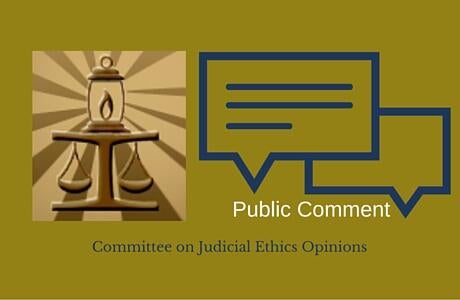
Public Comment Plays Unique Role in Judicial Ethics Opinions
Public comment helps the Supreme Court of California’s Committee on Judicial Ethics Opinions draft advisory opinions on ethics issues of importance to California’s judges—it also helps them decide whether to publish an opinion or redraft based on the comments received.
The Supreme Court’s committee is the only judicial ethics advisory committee that uses the public comment process for formal opinions anywhere in the United States. The public has already had the opportunity to comment on draft opinions dealing with issues ranging from political fundraising to the acceptance of gifts by judicial officers.
The committee is currently seeking public comment on a draft advisory opinion relating to judges meeting with vendors—how judicial officers may ethically meet with private vendors who provide goods or services to courts or parties under court order.
 Justice Judith Haller, Committee Member
|
|
To date, the committee has published eight formal opinions, all of which have received public comments that have ranged from being supportive to raising concerns about a draft opinion. Nevertheless, they always add perspectives and insights that assist the committee in finalizing the reasoning for a draft opinion and the decision to publish or not.
The committee has received up to 33 individual comments on an advisory opinion and at least 6 on every opinion it has issued for public comment. Many have included detailed and in-depth reviews of the draft—the longest comment received was a 26-page commentary—all have been informative.
All comments submitted to the committee are confidential and will not be disclosed—unless the commenter waives confidentiality. Comments are reviewed and carefully considered by the committee, and if confidentiality is waived, are published on the committee’s website for public review after the comment period closes.
The current draft opinion advises on steps judges may take to prevent lending the prestige of judicial office to a vendor or conveying the impression that the vendor is in a special position to influence a judge. Judicial officers can:
- Delegate initial communications with vendors to court administrative personnel
- Have court administrative determine the purposes of the meetings in advance
- Schedule panel meetings with competing vendors when possible
- Invite other judges and court personnel who are likely to use the products
- Have court administrative personnel attend for or with the judges
If a vendor's products or services are to be used by parties under court order, the draft opinion recommends that judges use caution, and:
- Confirm that the product or service is not the subject of litigation in the judges’ court
- Consider whether a person aware of the meeting would not reasonably identify a conflict of interest or entertain a doubt about the judges’ impartiality


